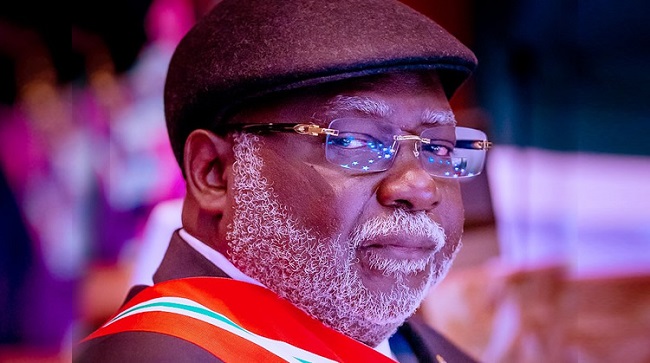The Chief Justice of Nigeria (CJN), Justice Olukayode Ariwoola, on Wednesday, said the major challenges confronting the Nigerian Judiciary are neither novel nor peculiar to the country.
“Analysing such issues through historical perspective may unearth workable solutions and strategies that have previously been tested and trusted”, Justice Ariwoola said, while speaking at the 3rd conferment of the National Judicial Institute (NJI) Fellowship Award in Abuja.
He noted that the fellowship award was to celebrate and openly express appreciation to distinguished persons who have positively impacted the NJI, the Judiciary and the country as a whole, with the wealth of their personalities.
The ceremony, he said provides the opportunity to walk through the annals of the Nigerian Judiciary and acknowledge the milestones and defining moments that have characterised the evolution of the country’s judicial system.
The CJN explained that the keynote lecture titled, “On the Cusp of History: Nigerian Judiciary and the Challenge of Transformation in the 21st Century”, offers a panoramic view of the judiciary’s past, developments in the present dispensation and possibly a preview of the desired state of affairs.
He said the profiles of the awardees give insights into how they were able to navigate and surmount similar challenges, at a time when the Judiciary was yet in its formative years.
In a keynote lecture, a seasoned Professor of Comparative Law, International Law and jurisprudence, Prof. Ademola Popoola, said an independent, fearless and impartial Judiciary is the greatest pillar of any democratic governance.
Popoola who delivered the 66-page keynote lecture also observed that respect for the rule of law is one of the principles regarded as essential to the effective and just operation of a popular government.
In his words, “The Judiciary remains the epicentre of conflict resolution and decision-making that makes group survival and social solidarity possible.
ALSO READ: Judicial reform: AGF steps in as CJN prevaricates
Popoola, who is also a fellow of the Nigerian Institute of Advance Legal Studies (FNIALS), said lawyers need to constantly beam searchlight on the country’s laws and legal institutions as well as issues of international and national governance generally.
He said the Judiciary is vested with the power to blow the whistle when the parameters of the constitutional covenant are transgressed as such, cannot be the alleged transgressor and added that it is only the Judiciary that has the final power to decide whether the impugned enactment or decree of a powerful legislature or the action of a powerful executive or administration transgressed the constitutional covenant in a credible democracy.
Earlier in his welcome address, the NJI Administrator, Justice Salisu Garba, said the institute was established to serve as the principal focal point of judicial activities relating to the promotion of efficiency, uniformity and improvement in the quality of judicial services in the superior and inferior courts in the country.
He said the institute has continued to enjoy undeniable support from key stakeholders within the justice system and has consistently drawn from the wealth of experience and expertise of renowned persons from both the Bar and the Bench since its inception 33 years ago.
The NJI boss said the awardees are being conferred with the Institute’s fellowship award in view of their influence and achievements which extended beyond the Nigerian Judiciary.
“This ceremony, which is the 3rd of its kind since the inception of the Institute and the first in nine years, will ultimately bring the number of the Fellows of the Institute to 35”, he said and commended the CJN for his dynamic leadership and support for the various activities of the Institute.
The Attorney General of the Federation (AGF) and Minister of Justice, Prince Lateef Fagbemi (SAN); Justice Kudirat Kekere-Ekun; Chief Adegboyega Awomolo (SAN); President of the Court of Appeal, Justice Monica Dongban-Mensem; and eight others were conferred with the NJI Fellowship Award.
The highlight of the ceremony was the commissioning of the Olukayode Ariwoola administrative building at the NJI by the CJN.
